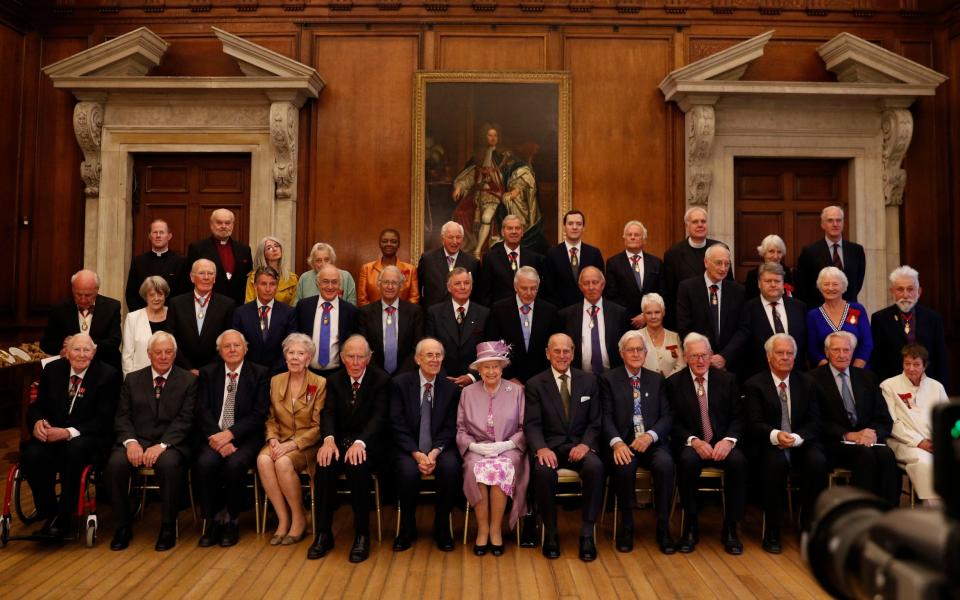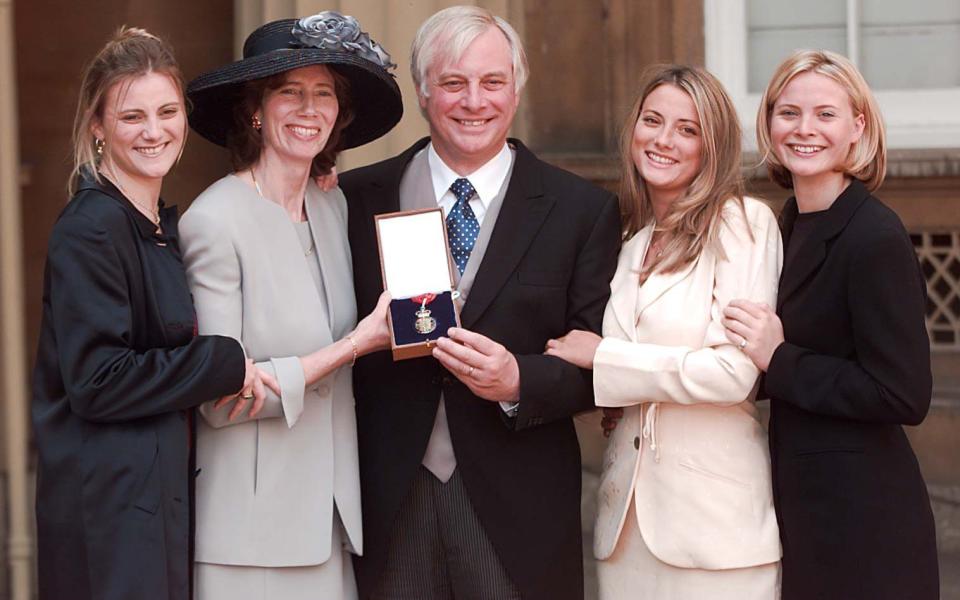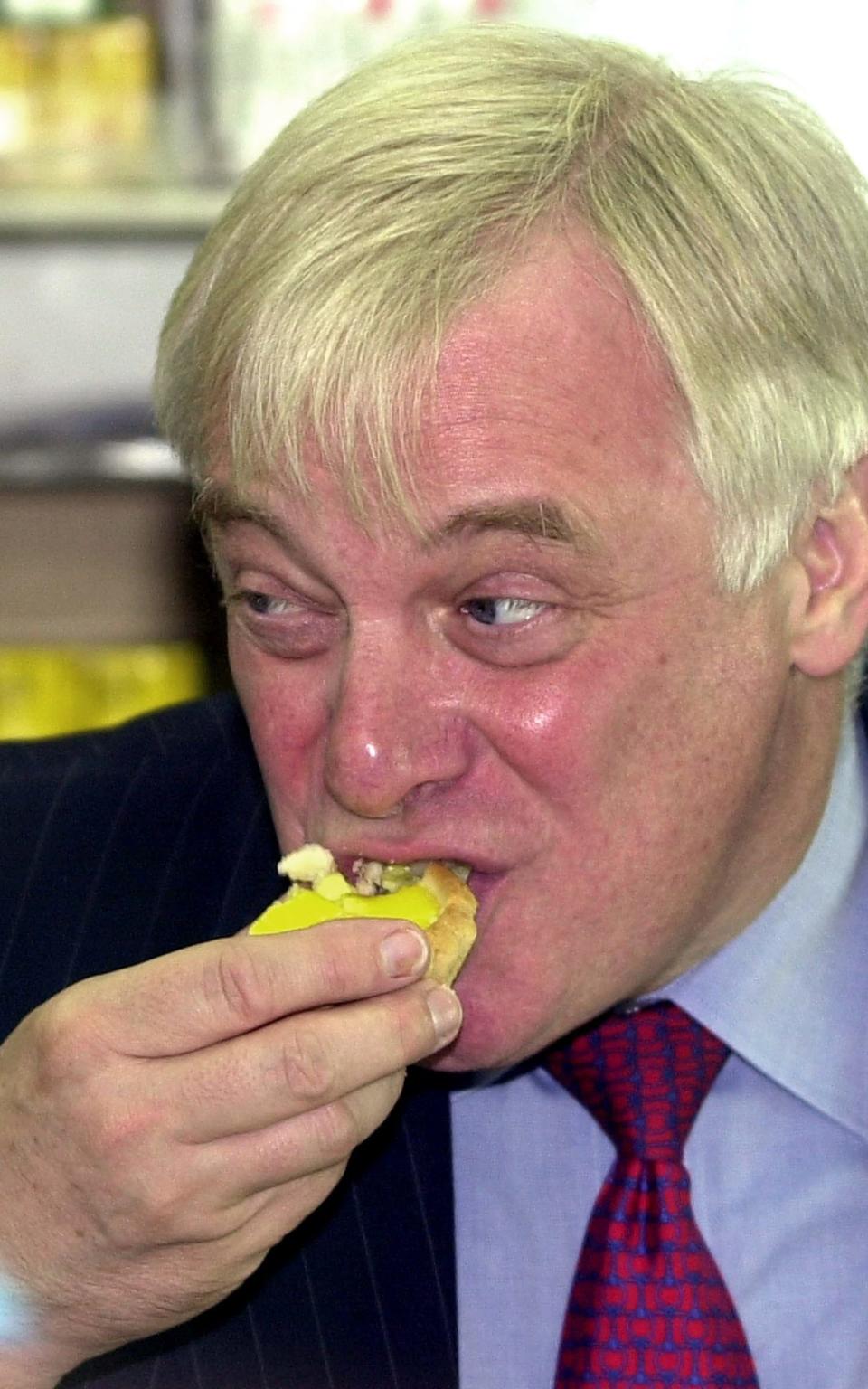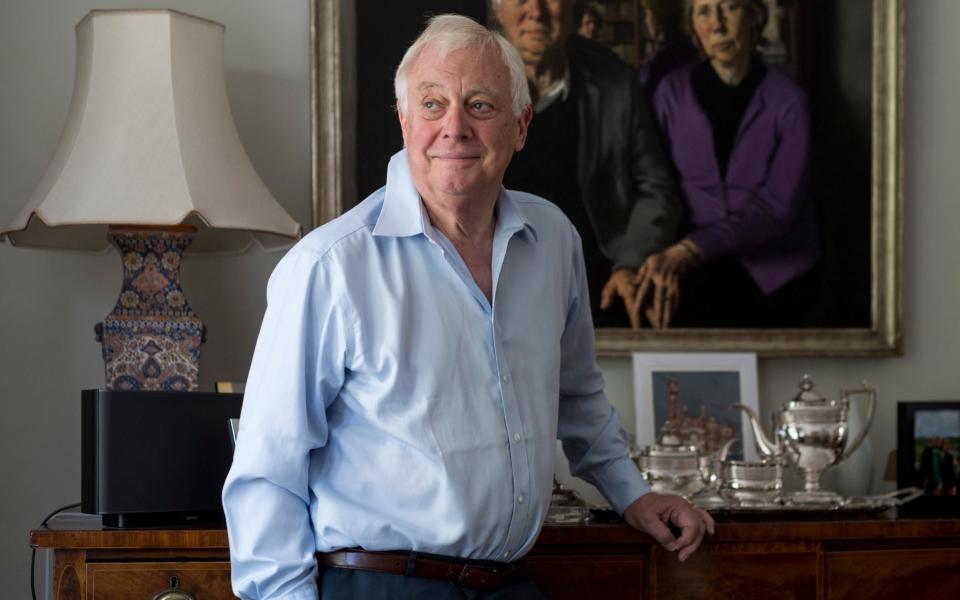Lord Patten: 'I doubt even Theresa May thinks she’s in for the long haul'

This week, Lord Patten of Barnes had a busier Tuesday than he is used to. Before lunchtime, he had conducted two interviews to promote his new book, First Confession: A Sort of Memoir, to be published later this month to coincide with the 20th anniversary of Hong Kong’s return to China.
In the afternoon, he went to Hampton Court to attend the Queen’s centenary celebration for her Companions of Honour, where he posed for an official photograph alongside other notables including Sir David Attenborough, Dame Judi Dench and Sir Roger Bannister.
Then, in the evening, he was taken to the Brompton Hospital, ahead of an operation the day after to fix a cardiac ablation. “The problem for me is that I fibrillate,” he says. “I fibrillate quite violently…”
I had a virus after Christmas, I went to Burma and it got worse
Lord Patten, 73
He had been due to be checked in with the doctors at 2pm but, mindful of his audience with Her Majesty, they gave him permission to defer until 7pm.
At 73, Lord Patten is no stranger to the operating theatre. “I had a virus after Christmas, I went to Burma and it got worse. What happens is fluid builds up in the legs during the day, and then at night it congregates on your lungs.” On his return to London, he took himself to hospital – and staff drained 10 kilos of fluid.
First Confession is dedicated to both his family and his cardiologists. In it, he writes that he’s been much luckier than his parents, both of whom died relatively young. Still, no sooner had he arrived in Hong Kong in 1992 as its last governor, aged 48, than he had a heart attack. His health – and weight – have fluctuated ever since.

Despite his impending surgery, he looks slimmer and fitter than on previous occasions. This is our fourth interview in the past two decades, including one on the verandah of Hong Kong’s former Government House (he was about to embark on a cabbage-soup diet in preparation for handover entertaining) and one in Brussels in 2002, when he was EU Commissioner for External Relations and clearly not on a diet.
The last time we met, in 2012, when he was chairman of the BBC Trust with a Dalek parked outside his office, Lord Patten looked greyly unwell. Two years later, he had another heart attack. “I was a lot heavier then and under huge stress,” he admits.
No sooner had Patten arrived in Hong Kong in 1992 as its last governor, aged 48, than he had a heart attack. His health and weight have fluctuated ever since
Only seven of the book’s 298 pages deal with his BBC era. “It wasn’t the happiest period of my life,” he says. “The people who told me the job was impossible were probably right.”
Three years after resigning on health grounds, Lord Patten is clear about how the BBC can secure its survival in the age of Netflix: slim down.
“Given the squeeze on funding, it can’t afford to go on doing all the things it’s doing at the moment, while spreading the marg more thinly. The identity of BBC Two and BBC Four, for instance, is increasingly confused. BBC Four – which, like a lot of middle-class people, I watch more than almost any other channel – is financed on a shoestring.” He only just stops short of suggesting that its more established sister channel be closed and its budget be diverted.

Today, he’s off duty and at home in Barnes, and surrounded by books, paintings, Chinese pottery and photographs of his family. His phone pings constantly as his three daughters, Kate, Laura and Alice, ring him to wish him good luck for his heart op. In the hall, there’s a photo of Whisky and Soda, now gathered to that great kennel in the sky, forever lolling on Government House lawn.
Events in the UK, however, have rather overtaken all thoughts of Hong Kong’s anniversary. On election night, Lord Patten was at the Irish Embassy in Rome preparing a speech on the future of Europe. The exit polls, however, meant his address needed a rewrite. “I’d said, right at the outset, I didn’t think the election would be a walk in the park. But I didn’t think it was going to be a walk in the cemetery.”
Now a crossbench peer, Lord Patten is wary of the party he served as chairman now being propped up in government by the Democratic Unionist Party. “I think it’s a thoroughly bad idea,” he says. “What is any close relationship with the DUP going to do to the Conservative brand?
“Theresa May said years ago, and was very brave to do so, that the electorate thought we were the nasty party. How do you make yourself look the nice party if you’re allied, however loosely, with a gang of people who are anti-gay, believe in Creationism and reject most of the social reforms that have been made not just in the United Kingdom but in the Republic of Ireland [which now has a gay prime minister of Indian heritage]? The advice I would have given is not to touch it with a bargepole.”
Lord Patten has first-hand experience of dealing with the DUP, from two years as a junior Northern Ireland minister in Margaret Thatcher’s second administration, when he helped reform the Royal Ulster Constabulary.
One of the consequences of the Troubles was an explosion in writing poetry. Some of the best poets writing in the English in the last few years - and not just Seamus Heaney - came from Northern Ireland
Lord Patten
“Colleagues in the House of Commons looked on my time in Northern Ireland as the equivalent of working in a Siberian power station,” he says, “but I loved it. Not the weather, but the topography, the countryside.
“One of the consequences of the Troubles was an explosion in writing poetry. Some of the best poets writing in the English in the last few years - and not just Seamus Heaney - came from Northern Ireland. I think we’ve been blind to the realities of life there for too long.”
For all his fondness, Northern Ireland has less than spotless memories of Patten himself. I happened to be in Belfast last week and a taxi-driver, hearing Patten’s name, immediately seethed: “I hate him. I’m a Unionist and he took the London out of Londonderry.”
That was 33 years ago, in 1984, when the city’s council came under the control of the Social Democratic and Labour Party who were, therefore, entitled – provocatively – to change its name. Patten, as junior minister, was obliged to sign off on it.

“I took legal advice, but there was absolutely nothing I could do,” he says now. “The Unionists called me the Minister of Treachery, and the DUP organised a march outside my house.”
It didn’t help that Patten is Catholic. His faith gives his book its title (from a famous Frank O’Connor short story), as well as its thread. The mea culpa aspect is strong in the earlier chapters, particularly recalling his relationship with his father whom he treated with “the supercilious patronising of a young smart-arse”.
His earliest religious memory is his father kissing him goodnight and tracing the letters “INRI” (Jesus of Nazareth, King of the Jews) on his forehead, as preservation “from sudden and unprepared death”. Patten did the same to his own children, and now to his grandchildren.
With his wife, Ed Balls could have done even better in the election than Jeremy Corbyn
Lord Patten
In 2010, he co-ordinated Pope Benedict’s visit to Britain. Certain issues with Scotland proved painful, thanks mostly to Alex Salmond. “He was very difficult to negotiate with,” Patten says. Still, the man who so humiliatingly lost his Bath seat in 1992 has some advice for both the former SNP leader and other big beasts who lost theirs earlier this month, a rollcall that includes Nick Clegg (whose wife, Miriam González Durántez, was part of Patten’s Brussels team). Might Strictly Come Dancing be the answer to their woes?
Patten (“a tango-dancer,” snorted Beijing once, intending insult) grins. “I thought Ed Balls took a huge risk doing the show, but what people discovered was that he was a real human being, full of self-deprecation and charm. They voted for him because, to their surprise, he was a very nice chap. With his wife, he could have done even better in the election than Mr Corbyn. But I don’t think either Alex Salmond or Nick Clegg would be wise to do it. Or even the Great British Bake Off.”
The other loser on election night, in Lord Patten’s eyes, was the sitting prime minister. “I would doubt whether even Mrs May would think she’s there for the long haul,” he says. The main reason we have “fetched up with this mess” was that she ran an “exceptionally weak” campaign: “One thing for sure is that the Conservative Party didn’t win the election.”
“Look, I am very, very reluctant to dance on anybody’s grave – I think it’s slightly unseemely – but I’m sure she has a sense of honour and dignity, and in due course that will determine what she does.”
For his money, there are “one or two grown-ups” in the Cabinet who could well replace her as Conservative leader, notably Home Secretary Amber Rudd, who he singles out as “impressive”, if only for “the way she handled herself against that hostile audience [during the TV election debate, when she stood in for the Prime Minister], without once losing her cool or her dignity”), and Chancellor of the Exchequer Philip Hammond (“an Oxford First, speaks beautiful French, has a hinterland and was a successful businessman”).
Greg Clarke, MP for Tunbridge Wells who was reappointed as Secretary of State for Business, Energy and Industrial Strategy, is “clearly a smart man... but if I really wanted to blight somebody’s prospects, I’d name them”.

That’s all in the unknowable future. We talk for a while about Hong Kong; in theory, there’s another 30 years to go for ‘one country, two systems’. The Occupy movement, abductions and unseen erosions of freedom don’t bode well but Patten remains optimistic. “Our time in Hong Kong made it very special to us, I never want to turn my back on it,” he says.
On this particular day, however, he’s measuring time’s span more modestly. The Patten tribe will be in France in August. “God willing,” he adds, with a murmur. “Provided everything goes well with my heart. That’s something to look forward to.”
First Confession: A Sort of Memoir by Chris Patten is published on 22 June by Allen Lane (£20). To order your copy for £16.99 plus p&p, call 0844 871 1514 or visit books.telegraph.co.uk


